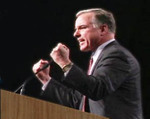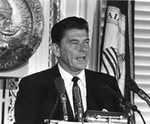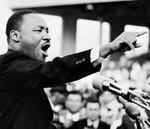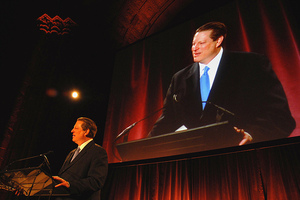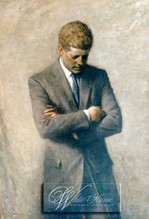
While some people want to liken Barack Obama to John F. Kennedy, that’s damning with faint praise.
As an historical figure JFK had more in common with the incumbent than with the current challenger. He was the wealthy son of a long-running Thesis, created under Roosevelt and validated by Truman. Other than his inaugural address there are few Kennedy speeches anyone could remember five minutes after they were made.
He’s used as he is because Democrats don’t have anything else to compare Obama with, because his brother and children and grandchildren are at the heart of the party today. They can’t use Bill Clinton since he’s in the other corner. They can’t use Jimmy Carter because he was a failure. And they certainly can’t use Lyndon Johnson. Truman’s daughter Margaret died recently at 83 — there is almost no memory of him. And he wasn’t really a scintillating speaker anyway.
So where does Obama’s speaking style come from? What is the heart of his message? What is the charisma all about? There are three main ingredients:
Most of what Obama is saying today is what Howard Dean said five years ago. Howard Dean built the crowd and the movement Obama inspires.
When Obama talks of change coming from the bottom up, that’s Dean. When he talks of values coming from our history, that’s Dean. When he talks about the importance of the Internet, that’s Dean, too. When he talks about balancing budgets, Dean stood for that. Still does.
The Iraq War was stupid in 2002? Howard Dean. We can win anywhere? Howard Dean.
Dean is a sort of Goldwater to Obama’s Reagan, the latter unable to exist without the trail the former blazed. Which brings us to the second ingredient.
It’s not just the charisma, the ability to act the part, which is Reaganesque. It’s not just the ease which draws members of the other party to him which is Reaganesque.
Obama embodies ideals, and idealism, the very idea of idealism, in the same way Reagan did long before he was elected. Obama also has an ideological center to him, just as Reagan did. (Expect a lot of stories over the next months over who created that center.)
Reagan’s center was grafted on to him by men who helped fund the Hoover Institution, which lost an entire generation after 1932. They adopted the hyper-patriotism which Roosevelt inspired, filed down what was raw in McCarthy’s anti-communism, added the passionate ideals of Goldwater. It’s not true what his biographers say — there was a there there with Reagan. Only Reagan didn’t put it there. He merely embodied it.
In the case of Barack Obama, Herbert Hoover is played by Adlai Stevenson. The programmatic liberalism of Stevenson was at the heart of what Barack Obama’s mother believed in. The idealism of living in the world is how his mother lived. It’s what links the Hawaii and Illinois Democracy. Stevenson’s problem was he couldn’t take it beyond an intellectual base. This is Hillary Clinton’s line of attack against Obama now, and it’s the one thing which could derail him.
Except for the third leg of this triad.
It’s not just Obama’s color which brings up comparisons with King. Many blacks, at first, resisted him.
Until they heard him.
Barack Obama spent much of the last 20 years absorbing the speaking cadences, and the political message, of the Civil Rights era. The south side of Chicago continues to incubate it. Obama’s church continues to incubate it. His wife, and her family, are possessed by it, and in possession of it.
It’s substantive as well as rhetorical, the obligation each of us has, one to all others. Don’t rise and pull the ladder up after you. Reach your hand down. Let everyone on the boat.
Jesse Jackson brought this idealism to the national political stage in the 1980s, and it’s the passion at the heart of Democratic politics today. The party has had great difficulty with it, because it’s so easy to demonize. But Democrats, even many Southern Democrats, believe in it. It’s the part of their ideology Dean couldn’t reach, an ache in their soul as deep as that Reagan touched in his movement.
Call it, if you will, Jacksonian Democracy. Yes, for Jesse. But for Andy, too. Andrew Jackson campaigned as a tribune of the people, distrustful of power, seeking mainly a chance. Obama marries these two, the roots of his party and the reasons for its exile.
Every generation a new medium, a new leadership style, a new idealism, and a new figure rise to embody what is meant by it all. They transform society and take it in a new direction, at the will of the people. They’re called great men, but all of them have antecedents in the past, in what was in our hearts all along.
That’s what makes American leadership so inspiring to the rest of the world. You and I, all of us, are the better angels of our own nature, when we choose to be inspired by them.
The great man embodies what is already in us. He reflects what we see as our own national spirit. He can’t inspire otherwise. He doesn’t t inspire because he’s magic. He inspires because he has learned what we know, and given us back our idealism in ways we understand and recognize.
Americans move forward, once each generation, when we’re given back what was in us all along.


